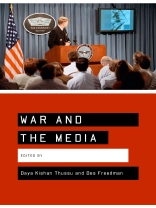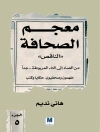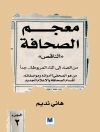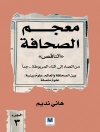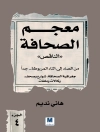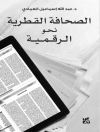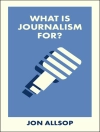`No book is more timely than this collection, which analyses brilliantly the Western media′s relentless absorption into the designs of dominant, rapacious power′ – John Pilger
`A most timely book, with many valuable insights′ – Martin Bell O.B.E
`It has long been known that the outcome of war is deeply influenced by the battle to win ′hearts and minds′. This book provides a stimulating set of perspectives which combine the analyses of prominent academics with the experiences of leading journalists′ –
Professor Tom Woodhouse, University of Bradford
`This volume represents an all-star cast of authors who have a tremendous amount of knowledge about media and world conflict. One of its strengths is that it doesn′t focus entirely narrowly on media, but puts the discussion of media issues in the context of changes in the world order in military doctrine′ –
Professor Daniel C. Hallin, University of California
`This book comes just in time. A coherent and wide-ranging collection of data, analyses and insights that help our understanding of the complex interaction between communication and conflict. A major intellectual contribution to critical thinking about the early 21st century′ – Cees J Hamelink, Professor International Communication, University of Amsterdam
With what new tools do governments manage the news in order to prepare us for conflict?
Are the media responsible for turning conflict into infotainment?
Is reporting gender specific?
How do journalists view their role in covering distant wars?
This book critically examines the changing contours of media coverage of war and considers the complexity of the relationship between mass media and governments in wartime.
Assessing how far the political, cultural and professional contexts of media coverage have been affected by 9/11 and its aftermath, the volume also explores media representations of the `War on Terrorism′ from regional and international perspectives, including new actors such as the Qatar-based Al-Jazeera – the pan-Arabic television network.
One key theme of the book is how new information and communication technologies are influencing the production, distribution and reception of media messages. In an age of instant global communication and round-the-clock news, powerful governments have refined their public relations machinery, particularly in the way warfare is covered on television, to market their version of events effectively to their domestic as well as international viewing public.
Transnational in its intellectual scope and in perspectives, War and the Media includes essays from internationally known academics along with contributions from media professionals working for leading broadcasters such as BBC World and CNN.
قائمة المحتويات
Introduction – Daya Kishan Thussu and Des Freedman
PART ONE: COMMUNICATING CONFLICT IN A GLOBAL WORLD
Contextualizing Conflict – Aijaz Ahmad
The US `War on Terrorism′
Watching What we Say – Ted Magder
Global Communication in a Time of Fear
Understanding not Empathy – Jean Seaton
PART TWO: NEW DIMENSIONS OF MANAGING CONFLICT
Information Warfare in an Age of Globalization – Frank Webster
The Counter-Revolution in Military Affairs – John Downey and Graham Murdock
The Globalization of Guerilla Warfare
Spinning the War – Robin Brown
Political Communications, Information Operations and Public Diplomacy in the War on Terrorism
`We Know Where You Are′ – Philip Taylor
Psychological Operations Media During /f003Enduring Freedom
PART THREE: REPORTING CONFLICT IN AN ERA OF 24//7 NEWS
Live TV and Bloodless Deaths – Daya Kishan Thussu
War, Infotainment and 24//7 News
Israel//Palestinian Conflict – Greg Philo, Alison Gilmour, Susanna Rust, Etta Gaskell and Lucy West
TV News and Public Understanding
Mapping the /f003Al-Jazeera/f001 Phenomenon – Noureddine Miladi
PART FOUR: REPRESENTATIONS OF CONFLICT – 9//11 AND BEYOND
War and the Entertainment Industries – Jonathan Burston
New Research Priorities in an Era of Cyber-Patriotism
The New Media Environment, Internet Chatrooms and Public Discourse After 9//11 – Bruce A Williams
The Media, `War on Terrorism′, and the Circulation of Non-Knowledge – Cynthia Weber
Icons and Invisibility – Jayne Rodgers
Gender, Myth, 9//11
PART FIVE: CONFLICT AND THE CULTURES OF JOURNALISM
Journalists under Fire – Howard Tumber and Marina Prentoulis
Subcultures, Objectivity and Emotional Literacy
Journalists and War – Nik Gowing
The Troubling New Tensions Post 9//11
Conflict and Control-Afghanistan and the 24-hour News Cycle – Kieran Baker
In the Fog of War… – Yvonne Ridley
Need for Context – Gordon Corera
The Complexity of Foreign Reporting
عن المؤلف
Des Freedman is Professor of Media and Communications in the Department of Media, Communications and Cultural Studies at Goldsmiths, University of London. He is co-director of the Goldsmiths Leverhulme Media Research Centre and a founding member of the Media Reform Coalition.His publications include, as editor, Capitalism’s Conscience: 200 Years of the Guardian (Pluto, 2021) and, as author, The Contradictions of Media Power (Bloomsbury, 2014), The Politics of Media Policy (Polity 2008), Misunderstanding the Internet (Routledge, 2016, co-authored with James Curran and Natalie Fenton) and The Media Manifesto (Polity, 2020, co-authored with Natalie Fenton, Justin Schlosberg and Lina Dencik). He has co-edited books on a wide range of themes including media, racism and terrorism, the politics of higher education, media reform and the future of television.
